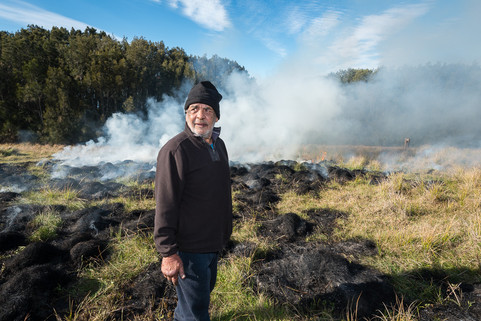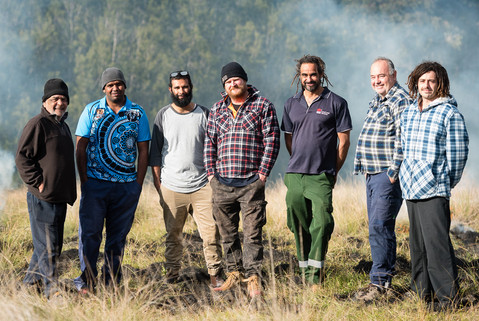Sharing ancient knowledge: South Coast NSW Walbanja Elders conduct first cultural burn on private land since the January bushfires
Photos by Gillianne Tedder
It’s a beautiful sight. The tall grass burns lightly across the hillside, thin white smoke drifting up towards the nearby trees, while local Aboriginal elders, landholders and friends watch on in safety. “This is the way it is supposed to be,” enthuses Walbanja elder and traditional owner Uncle Les Simon. He and other south coast experts in ‘cultural burning’, the ancient Aboriginal method of regenerating Country, are tending to the first burn on private land since January 2020, when we all saw the difference between what this careful, well-tended management and seriously out of control bushfires could do. Land-owners Mark and Julie Mills invited Les, along with Andy White, Dan Morgan, Noel Webster and their crew, to begin a long-term, controlled burn, which starts with this open grassland on their property at Meringo, before moving on to include coastal Eucalyptus forest at a later date.
This area is being burned first because that was what the conditions called for; or, to be more poetic and use a more indigenous phrase, this is what Country wants. The vegetation cover (in this case native Themeda grasslands), the wind direction, the slope and degree at which the lay of the land rolls away, the moisture content of the soil, the time of year; all of these ingredients in the micro-climate must be taken into account when planning a burn. When the conditions are right, the forest floor will get its turn to burn in this gentle way too.
Cultural burns are much cooler than hazard reduction burns and operate according to the deliberate use of natural mosaic patterns in nature, making control much easier and allowing for fauna to relocate and survive. Meanwhile, cultural burns not only remove leaf litter, thereby restoring the conditions under which native grasses can flourish, they also trigger the seedbank. Using fire the Aboriginal way, as a tool, controls weeds, reduces thick shrubs and fuel, and triggers the plant species that prefer this relatively ‘cold’ fire; the ones that became adapted to it over countless generations of Aboriginal tending to and caring for Country.
By contrast, hazard reduction burns (and our collective nemesis, the wild bushfires that are now so much more destructive than they have been), burn hot, and this tends to promote plant species that prefer hot fires, because they are the ones that survive such events. This becomes a vicious cycle, as the tendency for hot fire is locked into the forests and devastating bushfires become more, not less, likely.
In response to the need for more cultural burning on their traditional Country, Les and his mate Owen Carriage teamed up to form the South Coast NSW Aboriginal Elders association (SCAE). They work in partnership with Andy White – coordinator of the Batemans Bay Land Council’s environmental crew. SCAE are dedicated to promoting the safe use of fire to promote regeneration of bushlands, farms, and other properties, but the elders also have a bigger vision in mind. They are not only developing a business model for cultural burning on private properties of interested landholders, but they see this as a stepping-stone to a renewal of cultural traditions successfully steeped in time. SCAE intend to secure funding to create employment for elders and the youth they train, incorporating sustainable business models to offer superior products to the wider community. In time, they hope this will also include guided walks on Country, a local Rangers Program, cultural campsites that could be used to revitalise Aboriginal ceremony as well as provide for ecotourism possibilities, and more educational, training and employment opportunities.
If you are a private landholder with native vegetation and you’d like to engage a cultural burning team to manage your land, please contact Prue Bartlett on 0427 825 273.
SCAE has an ongoing Go Fund Me page to collect public donations for the Elders to get started properly. It can be found at https://www.gofundme.com/f/south-coast-aboriginal-elders-regenerating-country
You can also follow SCAE at https://www.facebook.com/SCNSWAE/














